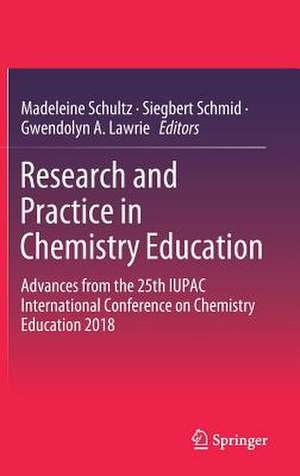Research and Practice in Chemistry Education: Advances from the 25th IUPAC International Conference on Chemistry Education 2018
Editat de Madeleine Schultz, Siegbert Schmid, Gwendolyn A. Lawrieen Limba Engleză Hardback – 18 apr 2019
Providing an overview of contemporary practice, this book helps improve student learning outcomes. Many of the teaching strategies presented are transferable to other disciplines and are of great interest to the global community of tertiary chemistry educators as well as readers in the areas of secondary STEM education and other disciplines.
Preț: 570.41 lei
Preț vechi: 713.01 lei
-20% Nou
Puncte Express: 856
Preț estimativ în valută:
109.18€ • 112.51$ • 92.17£
109.18€ • 112.51$ • 92.17£
Carte tipărită la comandă
Livrare economică 27 februarie-05 martie
Preluare comenzi: 021 569.72.76
Specificații
ISBN-13: 9789811369971
ISBN-10: 9811369976
Pagini: 275
Ilustrații: VIII, 274 p. 54 illus., 31 illus. in color.
Dimensiuni: 155 x 235 mm
Greutate: 0.58 kg
Ediția:1st ed. 2019
Editura: Springer Nature Singapore
Colecția Springer
Locul publicării:Singapore, Singapore
ISBN-10: 9811369976
Pagini: 275
Ilustrații: VIII, 274 p. 54 illus., 31 illus. in color.
Dimensiuni: 155 x 235 mm
Greutate: 0.58 kg
Ediția:1st ed. 2019
Editura: Springer Nature Singapore
Colecția Springer
Locul publicării:Singapore, Singapore
Cuprins
1 Introduction.- 2 Revisiting the understanding of redox reactions through critiquing animations in variance.- 3 Reframing chemistry learning: The use of student-generated contexts.- 4 Interactive immersive virtual reality to enhance students' visualisation of complex molecules.- 5 Faculty motivation for scholarly teaching and innovative classroom practice: An empirical study.- 6 Lessons learnt from teaching and learning during disruptions.- 7 Bridging the gap between philosophy of science and student mechanistic reasoning.- 8 Assessing for chemical thinking.- 9 Assessment of practical chemistry in England: An analysis of scientific methods assessed in high stakes examinations.- 10 Deciphering students' thinking on Ionisation energy: Utilising a web-based diagnostic instrument.- 11 A longitudinal view of students' perspectives on their professional and career development, through optional Business Skills for Chemists modules, during their Chemistry Degree Programme.- 12 Raw Communications and Engagement (RACE): Teaching science communication through modular design.- 13 Constructive alignment beyond content: Assessing professional skills in student group interactions and written work.- 14 Students' perceptions of group communication skills in an active learning environment.- 15 Improving the assessment of transferable skills in chemistry through evaluation of current practice.
Notă biografică
Madeleine Schultz has completed significant projects in chemistry education that have generated important practical outcomes for tertiary teachers and have had a direct impact on the teaching practices of many Australian chemistry academics. She founded the Chemistry Discipline Network, an active community of practice of chemistry educators in Australia. Her recent work characterises the practices of expert teachers and collated teaching strategies to accelerate the development of novice tertiary chemistry teachers. In 2017 she was awarded a Citation from the Chemistry Education Division of the Royal Australian Chemical Institute. She moved to Deakin University in 2018.
Siegbert Schmid’s research interests at the University of Sydney’s School of Chemistry lie in the synthesis and structural characterisation of aperiodic and other materials with potential technological applications. At the same time, he supports a chemistry education research group, supervising both PhD and honours students. The focus of his education research is improving current teaching and assessment practices to demonstrate learning outcomes for tertiary level students. He was awarded the Chemistry Education Division of the Royal Australian Chemical Institute Commemorative Medal in 2016.
Gwen Lawrie is an Associate Professor at the School of Chemistry and Molecular Biosciences (SCMB) at the University of Queensland (UQ). Successfully translating from a bench chemistry research career to chemistry education research in 2006, her projects address the diversity and engagement of students through blended learning environments, collaborative inquiry tasks; and mechanisms for provision of formative feedback to support self-regulated learning in online environments. She is the recipient of a 2013 Australian Teaching Excellence Award and, in her role as Director of First Year Chemistry Curriculum & Assessment, led the teaching team to a 2017 National Award for Programs that Enhance Learning.
Textul de pe ultima copertă
This book brings together fifteen contributions from presenters at the 25th IUPAC International Conference on Chemistry Education 2018, held in Sydney. Written by a highly diverse group of chemistry educators working within different national and institutional contexts with the common goal of improving student learning, the book presents research in multiple facets of the cutting edge of chemistry education, offering insights into the application of learning theories in chemistry combined with practical experience in implementing teaching strategies. The chapters are arranged according to the themes novel pedagogies, dynamic teaching environments, new approaches in assessment and professional skills – each of which is of substantial current interest to the science education communities.
Providing an overview of contemporary practice, this book helps improve student learning outcomes. Many of the teaching strategies presented are transferable to other disciplines andare of great interest to the global community of tertiary chemistry educators as well as readers in the areas of secondary STEM education and other disciplines.
Caracteristici
Distils current topics in chemistry education research at both secondary and tertiary levels Features improved pedagogies and instructional resources for chemistry education as well as transferable teaching strategies Includes contributions from international leaders and emerging experts in the field from 10 different countries
